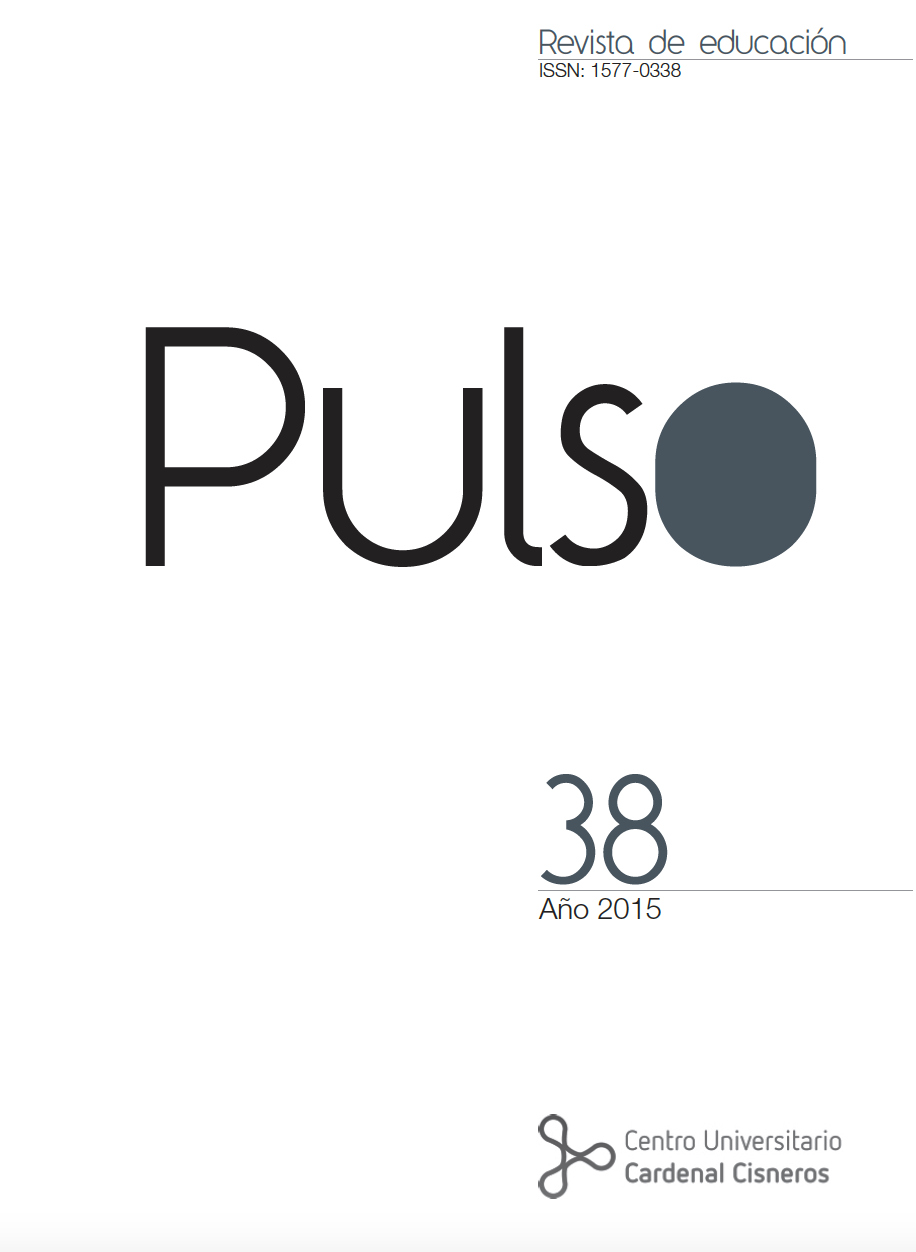The evaluative justice in the assessment of group projects: proposal and implementation in Grade of Primary Education
DOI:
https://doi.org/10.58265/pulso.5081Keywords:
Teaching of Social Sciences, Evaluation, Systematization, Efficiency, JusticeAbstract
This article develops a didactic proposal put into practice for three consecutive academic years, in which hetero– assessment, peer assessment and self-assessment are combined in order to ensure the evaluative justice, and the systematization and efficiency in follow-up process of students´ research projects. For the development of this paper, we focus on the third year of implementation (academic year 2013-2014) within the subject: «Integrated projects for teaching of Knowledge of Social and Cultural Environment» in 4th Grade in Elementary Education at the University of Huelva. During the application of this proposal, an increase in systematization of assessment processes was observed, as well as an improvement of efficiency in the processes of monitoring in tutorials, greater autonomy for students regarding the management of their group work and, finally, the development of an evaluative process of justice determined by the real commitment of each membe
Downloads
References
Alfageme, B. y Miralles, P. (2009). Instrumentos de evaluación para centrar nuestra enseñanza en el aprendizaje de los estudiantes. Iber, 60, 8-20.
Cañal, P.; Pozuelos, F.J. y Travé, G. (2005). Investigando Nuestro Mundo. Descripción general y fundamentos. Sevilla: Diada Editora.
Chica, E. (2011). Una propuesta de evaluación para el trabajo en grupo. Escuela Abierta, 14, 67-81.
Coughlan, D. y Coughlan, P. (2010). Notes toward a Philosophy of Action Learning Research. Action Learning: Research and Practice, 2 (7), 193-203. DOI: 10.1080/14767333.2010.488330.
De Alba, N. (2007). ¿Qué es ciudadanía? ¿Qué es Educación para la Ciudadanía?. En R. M. Ávila; R. López Atxurra y E. Fernández De Larrea (Coord.), Las competencias profesionales para la enseñanza-aprendizaje de las Ciencias Sociales ante el reto europeo y la globalización. Bilbao: AUPDCS/ Universidad del País Vasco.
Delgado Algarra, E. J. (2014). Educación para la ciudadanía en la enseñanza de las Ciencias Sociales y su vinculación con las dimensiones de la memoria: estudio de caso en ESO. Huelva: Universidad de Huelva. (Tesis doctoral). Recuperado de http://hdl.handle.net/10272/8841
Delgado García, A. M.ª (Coord.) (2005). Competencias y diseño de la evaluación continua y final en el Espacio Europeo de Educación Superior. Ministerio de Educación y Ciencia. Dirección General de Universidades
Estepa, J. (2013) (Ed.), La educación patrimonial en la escuela y el museo: investigación y experiencias. Huelva: Universidad de Huelva.
Evans, E. (2010). Orientaciones metodológicas para la investigación– acción. Propuesta para la mejora de la práctica pedagógica. Perú: Ministerio de Educación.
García Pérez, F.F. y Porlán, R. (2000). El Proyecto IRES (Investigación y Renovación Escolar). Biblio 3W. Revista Bibliográfica de Geografía y Ciencias Sociales, 205. Recuperado de http://www.ub.edu/geocrit/b3w-205.htm
Hancock, D.R. y Algozzine, B. (2006). Doing a Case Study. Teachers New York: College Press.
Kusahara, K. (2008). El sistema universitario japonés: Historia y perspectivas de futuro. Tôkyô: Kôbundô. [草原克豪〈2008年〉。日本の大学制度—歴史と展望。東京:光文堂。(en japonés)] .
López Meneses, E., Vázquez-Cano, E. y Fernández Márquez, E. (2014). Análisis de la percepción de los alumnos sobre las áreas de intervención del futuro educador y trabajador social a través de una didáctica digital con mapas conceptuales multimedia. RED. Revista de Educación a Distancia, 41, 1-17.
Martín-Monje, E., Vázquez-Cano, E. y Fernández, M. (2015). Peer assessment of language learning resources in virtual learning environments with e-rubrics. International Journal of Technology Enhanced Learning. 6(4), 321-342.
Moye, J. J.; Dugger, W. E. Jr.; Starkweather, K. N. (2014). "Learn by Doing" Research: Introduction. Technology and Engineering Teacher, 74 (1), 24-27.
Nakamura, T. (2003) Educational Aspirations and the Warming‐up/Cooling‐down Process: A Comparative Study between Japan and South Korea. Social Science Japan Journal, 6 (2), 199-220. DOI: 10.1093/ssjj/6.2.199
Nakamura, T. (2011). Expansión educativa y meritocracia: la paradoja de la examinación y la recomendación en la selección educativa. Tôkyô: Tôkyô Daigaku Shuppankai. [中村高康〈2011年〉。大衆化とメリトクラシー― 教育選抜をめぐる試験と推薦のパラドクス。東京:大学出版会。(en japonés)] .
Porlán, R., Azcárate, P., Martín Del Pozo, R. y Martín Toscano, J. (1996). Conocimiento profesional deseable y profesores innovadores: fundamentos y principios formativos. Investigación en la Escuela, 29, 23-38.
Mochizuki, Y. (2011). Exams of private elementary school in contemporary Japan: current conditions of educational choices based on parentocracy. Tôkyô: Gakujutsu Shuppankai [望月由起〈2011年〉。現代日本の私立小学校受験: ペアレントクラシーに基づく教育選抜の現状。東京:学術出版会。(en japonés)] .
Recomendación 2006/962/CE del Parlamento Europeo y del Consejo, de 18 de diciembre de 2006, sobre las competencias clave para el aprendizaje permanente [Diario Oficial L 394 de 30.12.2006].
Sato, K., y Hirano, M. (2014). School-Wide Collaborative Action Research for Curriculum Development. Japan Association for Language Teaching JALT2013 Conference Proceedings.
Tomes, J. L., Wasylkiw, L., y Mockler, B. (2011). Studying for Success: Diaries of Students' Study Behaviours. Educational Research and Evaluation, 1 (17), 1-12. DOI: 10.1080/13803611.2011.563087.
Downloads
Published
How to Cite
Issue
Section
License
Copyright (c) 2022 Pulso. Revista de educación

This work is licensed under a Creative Commons Attribution-NonCommercial-NoDerivatives 3.0 Unported License.
This journal offers immediate open access to its content based on the idea that offering readers free access to research favours a global exchange of knowledge.
Papers are published in the electronic version of the journal under a Creative Commons License: Attribution-NonCommercial-No derivatives 4.0 International
Authors are allowed and encouraged to promote the post-print version (reviewed and accepted for publication version) of their work online before publishing them. This favours their earlier circulation and dissemination and thus a possible increase in their citation and reach among the academic community.














